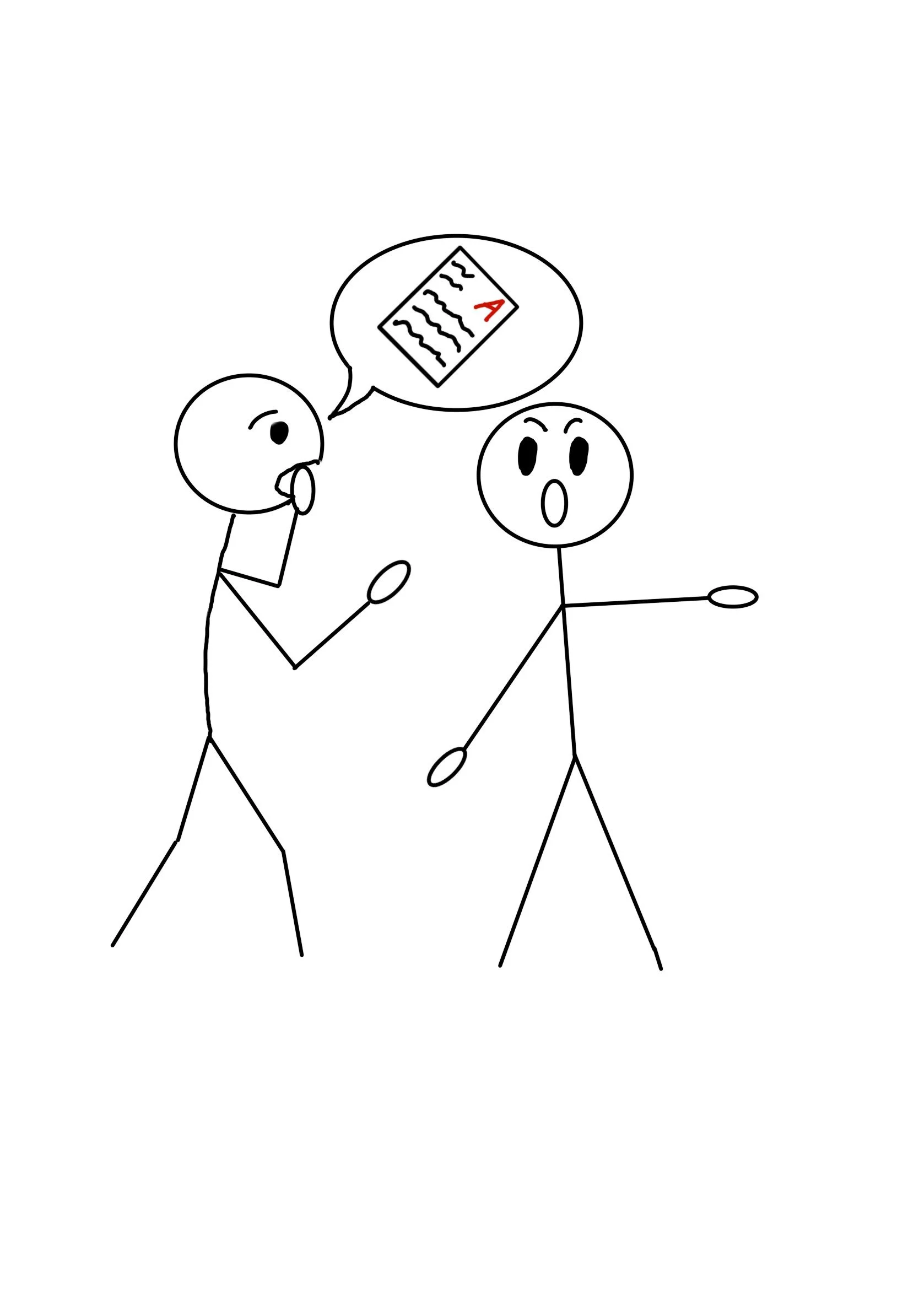OPINION: Stop comparing your grades to others
By Chip Downes Le Guin ‘25
Photo by Chip Downes-Le Guin ‘25
Whether it is finishing a math test or getting back a paper, it feels nearly impossible to go a week without being asked the question “What grade did you get?”
Despite its simplicity and presumable innocence, this simple act of comparison encapsulates and heightens what can be a toxic culture of grade comparison, one that often finds itself ingrained in institutions like Catlin Gabel School (CGS).
While CGS might not explicitly identify as a “college preparatory” school, its academically rigorous culture and status as an, according to Dan Petrocelli, “highly driven institution for college students” contribute to a competitive scholarly environment.
In this setting where A’s are the norm, B’s embarrassing, and C’s shameful, it is natural for many students to want to know whether they’re keeping up with their peers. This often brings up the question of “Where do I stand?”, one of the principal factors in why students ask others about their grades.
This is not always a harmful urge. For some students, finding commonality in harsh grading can allow for further discussion of needed changes in a class through the Student-Experience Survey or give support in not feeling like you were the only one who did poorly.
In my experience, sharing grades with close friends on occasional assignments that I felt ashamed of helped decrease my stress. I felt supported and less alone which helped bring me out of the negative feelings.
On the other hand, asking about someone’s grades can also create many negative feelings. If a student performed what they perceived as poorly on an assignment, overhearing “good” grades being shared or worse, having to say your own “bad” grade or lie also creates a feeling of isolation or perceived academic deficiency.
A study from the National Library of Medicine found that it is “difficult for high school students to avoid the comparison of academic performance” and when they do and “find what others have but do not possess, they will easily have mixed complex emotional experiences, such as inferiority, hostility, and resentment.”
On the other hand, if a student were to do well on an assignment that had a lower average grade, they could be put in a difficult situation when asked about their grade. Students are forced to ask themselves “Is it better to say my grade, risk sounding arrogant and making them feel worse about themselves, to lie about a worse grade, or give a non-specific answer that could be perceived as either one of them?”
In addition to the awkward situation created at the moment, a deeper fixation on how other students are doing academically in the long term is a byproduct. When students measure themselves against their peers, they are much more likely to focus on their shortcomings compared to others. For me, this marks a shift in mindset from “How can I improve?” upon a task to “How can I do better than others?”
In my experience, this has not been a form of healthy competition. Focusing on what other students have achieved does not change the results I’m unhappy with and instead wastes time and emotional energy.
These feelings of having to do better than others are amplified by the college search. By participating in the college application process we are inherently being compared to other students. Petrocelli described the comparative thought process of prospective students as, “I have to know where I stand because, in certain colleges, you have to have a certain standing that’s in the top percentage of students in the country.”
Petrocelli continued, “You look at the schools, what percentage gets accepted, and what grades you need and that is it. It’s just a product.” The process of learning to create a result that we can then submit and put in an application while keeping in mind how we must do better than others is not only hyper-competitive but also creates negative associations of grades equating to self-worth.
The stakes of the college process can make it difficult to disassociate from these negative symptoms. As described by the Daily Trojan, “Failing here means potentially not being able to find a job, enter high levels of education, or even connect with others.”
Petrocelli has found that these negative emotions, intrinsic focus on the future, and impersonal process of “just learning to create a result that we can then just submit and put in an application” can deprive students of long-term fulfillment. “Satisfaction is what feeds our inner soul, if we’re not having a certain depth of satisfaction in our life then we’re going to end up feeling empty,” said Petrocelli.
This pressure doesn’t just come from peers or the weight of the college process, but can also come from within one's own home. Petrocelli described how parents' pressures on their children can translate into competitiveness at school. “Pressure from parents can, especially concerning grades, make the kids kind of only worry about the end result unless in the process.” He continued, “And so then, kids can bring that to school in their interactions with other kids, and then that can result in an unhealthy academic culture.”
Parents can also bring with them a certain level of expectations for what college their kids will go to. At CGS, the pressure to get into a “good” college is a sort of rite of passage that is often tied to the wealth profile of the average student, another attitude that can translate from home to school.
While sharing grades can foster camaraderie and growth within a school, it is also a dangerous way to breed hyper-competitiveness and feelings of inadequacy and isolation. Next time you get a paper back, remember how sharing your grades can affect others and yourself before asking the dreaded question “What grade did you get?”.

